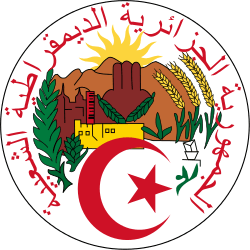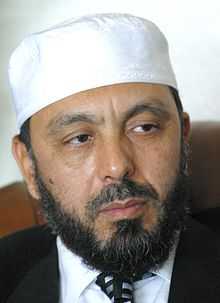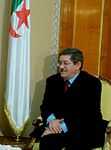Algerian legislative election, 2002
| | |||||||||||||||||||||||||||||||||||||||||||||||||||
| |||||||||||||||||||||||||||||||||||||||||||||||||||
| |||||||||||||||||||||||||||||||||||||||||||||||||||
| |||||||||||||||||||||||||||||||||||||||||||||||||||
 |
| This article is part of a series on the politics and government of Algeria |
|
Constitution |
|
Government |
| Foreign relations |
|
Politics portal |
The 2002 Algerian Legislative election was held in Algeria on 30 May 2002 to elect members of the People's National Assembly. The governing National Liberation Front (FLN) won a majority of seats in the election. The election suffered from a low turnout, violence and boycotts by some opposition parties.
Candidates
The election saw 10,052 candidates standing in the election from 23 political parties. Of the candidates, 694 were female and 1,266 were independents.[1]
Campaign
President Abdelaziz Bouteflika announced the date of the election on 20 February and the official campaign began on 9 May.[2] The President vowed that they would be free elections and warned people against undermining them.[3] However five opposition parties boycotted the election, the Socialist Forces Front (FFS), Rally for Culture and Democracy (RCD), Republican National Alliance (ANR), Movement of Democrats and Socialists (MDS) and the Socialist Workers' Party (PST).[1] They claimed that previous elections in 1997 and 1999 were fraudulent and that this election would be no different.[4]
A survey carried out by Al-Watan newspaper showed that 70% would vote for one of the 3 parties in the ruling coalition, the FLN, National Rally for Democracy and the Movement of Society for Peace.[5] The FLN of Prime Minister Ali Benflis campaigned on a platform of unifying the different social groups of Algeria such as by regional development in the south. The RND, which had won the most seats at the last election in 1997, campaigned for economic liberalisation but was undermined by the lack of a base of support or a social ideology.[2] The leader of the RND, Ahmed Ouyahia, warned of the dangers of an Islamist victory but his concerns were dismissed by the interior minister.[1] The opposition Workers' Party led by Louisa Hanoune campaigned against outside interference in Algeria and against privatisation.[2]
The campaign saw widespread apathy with many people seeing the parliament as toothless and the military as remaining the main power.[6] The FLN attempted to raise interest in the election by doing things such as creating a rap song for younger people.[2] However the poll by El Watan showed that over a third planned not to vote and in areas such as Bab el-Oued election billboards were mostly empty.[3][7] High unemployment, water and housing shortages were also seen as contributing to the apathy in the election.[4]
Election day
On the day before the election 23 people were killed in Sendjas by the Armed Islamic Group (GIA) in continued violence from the Algerian Civil War.[8] On polling day itself security forces were out in force in Algiers with many roadblocks to prevent terrorist attacks.[4]
In the north eastern Kabylie region a general strike was organised and running battles took place in the regional capital Tizi Ouzou to try to prevent the election from taking place in the region. Throughout much of the area polling stations were deserted and many did not open at all.[9]
Results
The results saw the National Liberation Front win a clear majority of seats. The party won over triple the seats it won at the last election, going from 64 to 199 seats.[6] The RND dropped from 156 seats to 47 in a disastrous result for the party.[10] The moderate Islamist parties suffered a small overall decline in support, with the MSP losing half its seats but the Movement for National Reform made gains and won 43 seats.[2]
Turnout in the election was the lowest yet since independence in 1962.[4] Only 47% of the registered voters turned out to vote, compared to 63% in the 1997 election.[4] 25 women were elected, 18 from the FLN, and after the election the number of women ministers was increased from one to five.[2]
| Parties | Votes | % of Votes | Seats |
|---|---|---|---|
| National Liberation Front (Jabhat at-Taḥrīr al-Waṭaniyy / Front de Libération National) | 2.618.003 | 34.3 | 199 |
| Movement for National Reform (Ḥarakat al-Iṣlāḥ al-Waṭaniyy / Mouvement du Renouveau National) | 705.319 | 9.5 | 43 |
| National Rally for Democracy (at-Tajammu` al-Waṭaniyy ad-Dīmuqrāṭiyy / Rassemblement National Démocratique) | 610.461 | 8.2 | 47 |
| Movement for the Society of Peace (Ḥarakat Mujtama` as-Silm / Mouvement de la Société pour la Paix) | 523.464 | 7.0 | 38 |
| Workers' Party (Ḥizb al-`Ummāl / Parti des Travailleurs) | 245.770 | 3.3 | 21 |
| Algerian National Front (al-Jabhah al-Waṭaniyyah al-Jazā'iriyyah / Front National Algérien) | 113.700 | 1.6 | 8 |
| Islamic Renaissance Movement (Ḥarakat an-Nahḍah / Mouvement de la Renaissance Islamique) | 48.132 | 0.6 | 1 |
| Party of Algerian Renewal (Ḥizb at-Tajdīd al-Jazā'iriyy / Parti du Renouveau Algérien) | 19.873 | 0.3 | 1 |
| Movement of National Understanding (Ḥarakat al-Wifāq al-Waṭaniyy / Mouvement de l'Entente Nationale) | 14.465 | 0.2 | 1 |
| Non-partisans | 365.594 | 4.9 | 30 |
| Front of Socialist Forces (Jabhat al-Quwā al-Ištirākiyyah / Front des Forces Socialistes) Rally for Culture and Democracy (at-Tajammu` min 'ajl aṯ-Ṯaqāfah wad-Dīmuqrāṭiyyah / Rassemblement pour la Culture et la Démocratie)
|
boycott | ||
| Total (turnout 46.2%) | 389 | ||
References
- ↑ 1.0 1.1 1.2 "Guide to Algeria elections". BBC Online. 2002-05-28. Retrieved 2008-08-01.
- ↑ 2.0 2.1 2.2 2.3 2.4 2.5 "Algeria - Diminishing Returns: Algeria’s 2002 Legislative Elections(ICG Report)" (PDF). ACE Electoral Knowledge Network. 2002-05-28. Retrieved 2008-08-01.
- ↑ 3.0 3.1 "Algeria Holds Elections, and Few Care". Fox News Channel. 2002-05-30. Retrieved 2008-08-02.
- ↑ 4.0 4.1 4.2 4.3 4.4 "Ruling party wins Algeria election". CNN. 2002-05-31. Retrieved 2008-08-01.
- ↑ "Berbers boycott polls". Al-Ahram. 2002-05-30. Retrieved 2008-08-02.
- ↑ 6.0 6.1 "Ruling NLF Makes Gains in Algerian Poll". The St. Petersburg Times. 2002-06-04. Retrieved 2008-08-01.
- ↑ "Algeria: Boycott, Violence Roil Algerian Elections". AllAfrica.com. 2002-05-30. Retrieved 2008-08-02.
- ↑ Tremlett, Giles (2002-05-31). "Death and dissent as Algeria goes to polls". London: guardian.co.uk. Retrieved 2008-08-02.
- ↑ "Protesters boycott Algerian polls". BBC Online. 2002-05-30. Retrieved 2008-08-02.
- ↑ "Algerian Insurgency". GlobalSecurity.org. Archived from the original on 14 August 2008. Retrieved 2008-08-02.
| ||||||||||||||||||||||||||
.jpeg)

